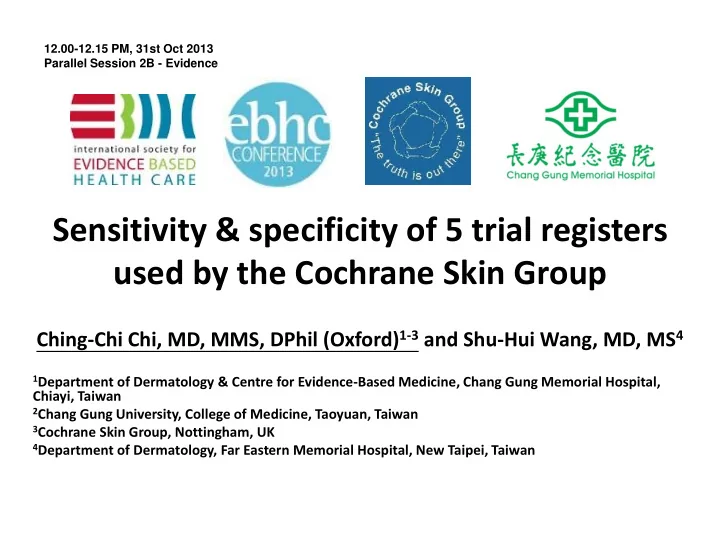

12.00-12.15 PM, 31st Oct 2013 Parallel Session 2B - Evidence Sensitivity & specificity of 5 trial registers used by the Cochrane Skin Group Ching-Chi Chi, MD, MMS, DPhil (Oxford) 1-3 and Shu-Hui Wang, MD, MS 4 1 Department of Dermatology & Centre for Evidence-Based Medicine, Chang Gung Memorial Hospital, Chiayi, Taiwan 2 Chang Gung University, College of Medicine, Taoyuan, Taiwan 3 Cochrane Skin Group, Nottingham, UK 4 Department of Dermatology, Far Eastern Memorial Hospital, New Taipei, Taiwan
Background • Cochrane review authors are required to search trials registers for relevant trials to avoid missing unpublished evidence. • The Cochrane Skin Group advises review authors to search: 1. metaRegister of controlled trials (mRCT), 2. ClinicalTrials.gov (CT), 3. World Health Organization International Clinical Trials Registry Platform (ICTRP), 4. Australian New Zealand Clinical Trials Registry (ANZCTR), 5. EU Clinical Trials Register (EUCTR). • However, searching multiple trial registers is a tedious task. 31 Oct 2013 ISEHC Dr Ching-Chi Chi, MD, MMS, DPhil (Oxford)
Objective • To compare the sensitivity and specificity of the five trial registers used by the Cochrane Skin Group in identifying relevant studies. 31 Oct 2013 ISEHC Dr Ching-Chi Chi, MD, MMS, DPhil (Oxford)
Methods • The five registers were searched for relevant studies for two Cochrane reviews* that the author was involved. • The sensitivity of a register was defined as below: relevant t rials identified in a register Sensitivit y all relevant t rials relevant t rials identified in a register Specificit y all trials identified in a register *The two Cochrane reviews are: #1 Chi CC, Kirtschig G, Baldo M, Brackenbury F, Lewis F, Wojnarowska F. Topical interventions for genital lichen sclerosus. Cochrane Database of Systematic Reviews 2011, Issue 12. Art. No.: CD008240. DOI: 10.1002/14651858.CD008240.pub2. #2 Lee C, Chi CC, Hsieh SC, Chang CJ, Delamere FM, Peters MC, Kanjirath PP, Anderson PF. Interventions for treatment of herpes simplex labialis (cold sores on the lips). Cochrane Database of Systematic Reviews 2011, Issue 10. Art. No.: CD009375. DOI:10.1002/14651858.CD009375. 31 Oct 2013 ISEHC Dr Ching-Chi Chi, MD, MMS, DPhil (Oxford)
Results • A total of 7 and 48 trials relevant to the first and second Cochrane review were identified, respectively. • For the first Cochrane review, the sensitivity for mRCT, CT, ICTRP, ANZCTR, and EUCTR was 57%, 57%, 86%, 0%, and 43%, respectively. The specificity was 100%, 80%, 75%, NA, and 75%, respectively. A completed and published trial was mislabelled as ‘recruiting’ or ‘unknown’ in the mRCT, CT, and ICTRP. • For the second Cochrane review, the sensitivity for mRCT, ClinicalTrials.gov, ICTRP, and ANZCTR was 40%, 56%, 81%, 2%, and 25%, respectively. The respective specificity was 76%, 79%, 100%, 3%, and 100%. A completed trial was mislabelled as ‘active, not recruiting’ in the mRCT. 31 Oct 2013 ISEHC Dr Ching-Chi Chi, MD, MMS, DPhil (Oxford)
• Overall, the ICTRP was the best, while the ANZCTR was the worst. • Apparently, no single trial register encompasses all relevant trials and provide correct information about study status. Sensitivity Sensitivity in Specificity Specificity in Study status Study status in review review #2 in review review #2 correctly correctly #1 #1 labeled in labeled in review #1 review #2 mRCT 4/7 (57%) 19/48 (40%) 4/4 (100%) 19/25 (76%) 3/4 (75%) 18/19 (95%) CT 4/7 (57%) 27/48 (56%) 4/5 (80%) 27/34 (79%) 3/4 (75%) 27/27 (100%) ICTRP 6/7 (86%) 39/48 (81%) 6/8 (75%) 39/39 (100%) 5/6 (83%) 5/5 (100%) ANZCTR 0/7 (0%) 1/48 (2%) 0/0 (NA) 1/34 (3%) NA 1/1 (100%) 3/7 (43%) 12/48 (25%) 3/4 (75%) 12/12 (100%) 3/3 (100%) 12/12 (100%) EUCTR 31 Oct 2013 ISEHC Dr Ching-Chi Chi, MD, MMS, DPhil (Oxford)
Portal • Only simple search: mRCT • Advanced search provided by CT, ICTRP, ANZCTR, and EUCTR • Lacking search history, not as powerful as bibliographic databases 31 Oct 2013 ISEHC Dr Ching-Chi Chi, MD, MMS, DPhil (Oxford)
Search results • Various formats. • None could be exported to references manager softwares, such as EndNote. 31 Oct 2013 ISEHC Dr Ching-Chi Chi, MD, MMS, DPhil (Oxford)
Study status • No trial registers provided complete correct information about the study status. • A trial already published in June 2011 was still labelled as ‘recruiting’ in mRCT and CT. 31 Oct 2013 ISEHC Dr Ching-Chi Chi, MD, MMS, DPhil (Oxford)
Limits • The limitation of this result was based on the searching exercise for two Cochrane reviews that the authors were involved. 31 Oct 2013 ISEHC Dr Ching-Chi Chi, MD, MMS, DPhil (Oxford)
Bottom line • Authors should keep current strategy of searching all trial registers, and recheck the status information provided by trial registers. • There is room for improvement of the sensitivity and the accuracy of trial status information by frequent updating and collaboration between registers. 31 Oct 2013 ISEHC Dr Ching-Chi Chi, MD, MMS, DPhil (Oxford)
Abstract submission from 15 Feb, 2014 Very early registration by 31 March, 2014 early registration by 30 June, 2014
Recommend
More recommend